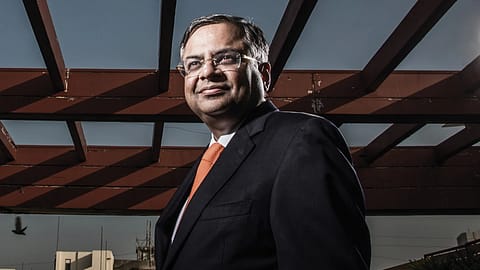Tata Trusts extends Chandrasekaran's term as Tata Sons Chairman till 2032
This move comes amid internal board disputes and calls for greater transparency. The extension is intended to reinforce stability and confidence in the Tata Group, a key player in India's economy

In a strong show of confidence in his leadership, Tata Trusts has granted a historic third term to Tata Sons Chairman N. Chandrasekaran, according to a report published in The Economic Times. Although Chandrasekaran's (fondly called Chandra) current term ends in February 2027, as he will turn 65, and the Tata group's rules require executives to retire at that age, the holding company of the Tata group approved a record third term for Chandra, thus making an exception. The multibillion-dollar group is yet to make an official statement on the matter.
With this extension, Chandra will continue as Tata Sons chairman until 2032.
The development is significant as the extension of Chandra's term comes at a time when the Tata Trusts is embroiled in infighting within the board over the issues of governance. Last week, Home Minister Amit Shah and Finance Minister Nirmala Sitharaman are said to have communicated separately with Tata Trusts chairman Noel Tata, trustee Darius Khambata, and Tata Sons chairman Chandrasekaran, stressing the importance of maintaining stability and confidence in the Tata Group, a key pillar of the Indian industry.
Chandra had joined Tata's board in October 2016 and was unanimously appointed its executive chairman in 2017.
Before that, Chandrasekaran was the chief executive officer and managing director of Tata Consultancy Services since 2009. Under his leadership, TCS consolidated its position as the largest private sector employer in India and the country’s most valuable company.
He is also the author of Bridgital Nation, which presents a powerful vision for the future. Chandra is also on the International Advisory Council of Singapore’s Economic Development Board (EDB). He is the chairman of the Indian Institute of Management, Lucknow, as well as the president of the court at the Indian Institute of Science, Bengaluru.
Additionally, he is the co-chair of the India-U.S. CEO Forum. He is also on the board of governors of the New York Academy of Sciences and has been elected as an international member of the United States National Academy of Engineering (NAE). Chandra was conferred with the Padma Bhushan, one of the highest civilian awards in India, in the field of trade and industry in 2022.
Recommended Stories
The current rift began when the Trusts’ board rejected the reappointment of Vijay Singh as the Tata Sons board nominee. Trustees Mehli Mistry, Darius Khambata, Jehangir, and Jhaveri opposed Singh’s reappointment and instead proposed Mistry’s name for the post. However, Noel Tata and Venu Srinivasan declined, arguing that it was “not the ethical way Tata operates.” The disagreement reportedly escalated into a heated exchange before the issue went to a vote.
Tuesday last week, Noel Tata and N Chandrasekaran met the two Union Ministers to brief them on the internal turmoil. The government, concerned about the potential fallout, reportedly warned that continued infighting could undermine investor confidence and damage the Tata Group’s global reputation.
Adding fuel to the fire, the Shapoorji Pallonji (SP) Group, which holds an 18.38% stake in Tata Sons, also renewed its call for the public listing of the holding company of the $180-billion salt-to-electronics conglomerate, stating that greater transparency and good governance are essential amid recent developments related to the Tata Trusts.
(INR CR)
Meanwhile, the board meeting of the Tata Trusts on Friday last week concluded without incident, as the two factions—led by Noel Tata and Mehli Mistry—confined their discussions to the official agenda, focusing mainly on the Trusts’ philanthropic activities.